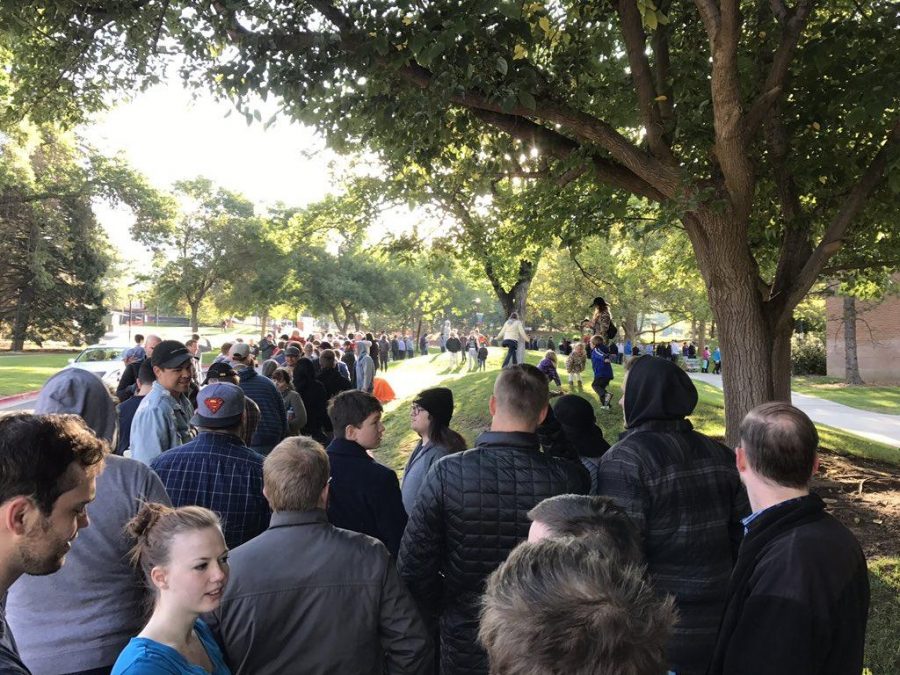
Emily Anderson
At least 1,000 people waited in line on Sept. 23, 2017, with the hope of securing a ticket to see Ben Shapiro at the University of Utah.
A line of more than 1,000 people snaked around the Union building at the University of Utah on Saturday morning as the school’s Young Americans for Freedom (YAF) chapter distributed free tickets for a Ben Shapiro speaking engagement.
YAF only had 400 tickets and 50 standby slots available for the event, which will be held in the Social and Behavioral Science Building Auditorium on Sept. 27. Many people, despite waiting since the early morning hours, had to be turned away.
Dillon Clark, a member of YAF, said the group couldn’t book a larger venue for the conservative radio host and founder of The Daily Wire because of conflicting student events.
“We’re glad that everyone came out,” Clark said. “We feel bad that we couldn’t accommodate everyone, but we want to do it again next year or in the spring.”
The Facebook page for the public event, titled “Trigger Warning,” says Shapiro will “take on leftist myths of white privilege, trigger warnings, microaggressions and diversity,” a stance many students take issue with.
Approximately 30 students stayed overnight in the Center for Ethnic Student Affairs office at the Union in an attempt to secure tickets to peacefully protest the event. In response, YAF moved the ticket distribution table from its original location in the West Union Ballroom to the front of the building. YAF members said the demonstrators weren’t given tickets as they “didn’t follow the rules.” One of the students, Jasmine Robinson, said that she believes YAF discriminated against the group.
“YAF took one look at the group of ethnic minorities and shut the door,” Robinson said. “They asked if we were protesters, and we said ‘No, we just want tickets.’ They then went behind our backs and moved the table outside and began giving tickets to the majority-white people in line. They weren’t asking if they were protesters, they just started handing out the tickets.”
On the table, YAF had a sign that read, “Young Americans for Freedom at the University of Utah reserves the right to remove any individuals who act contrary to the terms agreed upon at point of sale. This includes verbal disruption, obscuring the view of others during the event, or any action deemed to be disruptive of the event.”
Organizers didn’t say, however, whether there were limitations on who could receive tickets or gain access to the event. YAF later agreed to give the group who stayed overnight seven tickets.
Ten days prior, a group of about 50 students organized by the U’s chapter of Chicanx Student Movement of Aztlán rallied outside of U President David Pershing’s office to call on the administration to cancel the event. One of the protesters said that if the U allows Shapiro to speak, the school is “normalizing hate speech.”
“The policy of the university is that a fully-registered student group has the right, just like you do, to invite speakers … The jurisdiction we have is safety,” Pershing told protesters.
U officials and police officers attended a Shapiro speaking event at the University of California Berkeley on Sept. 14 to observe how security handled protests. The Berkeley Police Department reported that there were nine arrests, but no one was injured.
“We will have every officer in our department on duty that day, and we have also been in contact with Salt Lake City and some outside resources to possibly assist with security for participants in the event,” said U Police Deputy Chief Rick McLenon. “When I say participants, that’s both sides — so unbiased.”
In the past, when the public California State University, Los Angeles, attempted to cancel Shapiro’s visit, he filed a lawsuit against the school for violating his First Amendment rights. YAF contends that if the U called off the event, the university would be disregarding the right to free speech. Clark said that the group feels the event will create an opportunity for dialogue between opposing sides.
“If we shut him down, we’re not solving anything,” Clark said. “Obviously he has a very large presence and a lot of people listen to him. I respect their First Amendment right to protest, and I hope they respect our First Amendment right to bring in a speaker.”
@emilyreanderson
e.anderson@dailyutahchronicle.com
